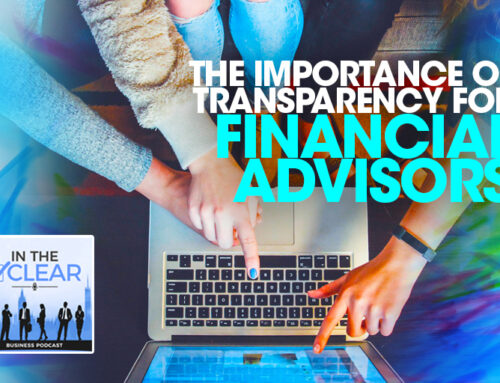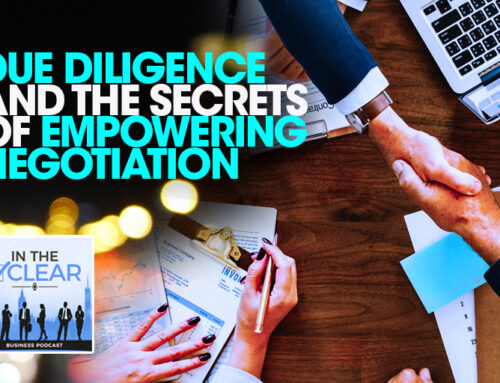 Isaac Belden joins Justin Recla to discuss the importance of incorporating transparency in the credit card processing industry. As an “accidental salesman,” Isaac Belden claims that he chose to stay in the credit card processing and business funding space because he knew that someone needed to disrupt it. Listen in as he shares how transparency alters credit card processing.
Isaac Belden joins Justin Recla to discuss the importance of incorporating transparency in the credit card processing industry. As an “accidental salesman,” Isaac Belden claims that he chose to stay in the credit card processing and business funding space because he knew that someone needed to disrupt it. Listen in as he shares how transparency alters credit card processing.
Welcome to the In The Clear podcast. I’m your host, Justin Recla, and today, I’m excited, because we’re talking to a veteran who owns his own business, who’s doing some great things in the world, especially with some of the programs he’s got.
Today, we’re talking about transparency in the credit card processing industry with Isaac Belden. He’s of 12B Capital, and I’m super excited to have him on the show, because he’s doing things a lot differently than most in the credit card processing arena, and when you hear what he’s doing, I think you’re going to be super excited about it as well. Isaac, welcome to the show.
Hey, thank you for having me.
Isaac, can you give us a little bit of background on what 12B Capital is?
12B Capital was kind of born from the idea that credit card processing, being such a necessary service, it’s being done wrong by a lot of different companies. I felt like there was another way of doing it, where we can take these customers and take a look at their businesses, and realize that we are a vital part of what they do, and being able to do that the right way and treat them the right way is absolutely necessary to ensure a good relationship and a long term relationship between us and these merchants.
Absolutely, and I think you hit the nail on the head there with the fact that … and this is one of the things that I love about what you’re doing is because for most businesses, credit card processing, yes, it’s essential, but most people don’t necessarily have a relationship with their credit card processor, and you bring a very unique offering to the table because of some of the programs that you have. It’s not just you’re helping people process their transactions, but you’re also helping them give back. Can you talk a little bit more about what that is?
Yeah. When my wife and I, we decided to go out on our own, we wanted our business to be more than just a way to make money. Obviously, everybody goes into business, or takes a job, because they have bills that need to be paid, but we have the thought that if in doing that, we could create this vehicle for change, or this vehicle for good, for a lack of better words. In the meantime, or at the same time, I should say, then why wouldn’t you want to do it?
We came up with the idea of 12B Gives, where we’re going to walk into a business, and we’re going to say, “Hey, we can save you money,” right? But everybody says that, so that didn’t really set us apart. We wanted to be able to say, “Hey, we’re going to save you money on your processing, but we’re also going to dedicate 10% of what we make from this relationship, and we’re going to give it back to a non-profit of your choice. So, what that looks like is, we’re going to do a side-by-side comparison. We’re going to prove to you on paper that our pricing stacks up much better than our competition, but then we’re going to take money that would typically go directly into our pocket, and we’re going to split it off to something that you really care about.”
And that has really spoken to a lot of business owners, because we’re not just coming in and saying, “Hey, we’re going to save you money,” and that’s it. We’re saying, “We’re going to save you money and show that we care about something that you care about,” and that’s really put us on a different plane as far as credit card processing guys go, and it’s just been really fun to explore and see where it goes.
I love that, because in one of the shows that we recently did here on In The Clear was about conscious businesses, and how clients nowadays, clients and customers, are really looking for relationships with those conscious businesses, and that’s what I love about what you’re doing with 12B is that you’ve integrated that into your business model, and it’s not just about making money, it’s about giving back, and that’s huge. That’s absolutely huge.
Is that self guided? Is that something that 12B does on behalf of the business owner? Does the business owner get acknowledged in the give? What does that look like?
I’m actually glad you asked that, because on the business to business level, where we’re working with individual business owners, we definitely acknowledge the business owner, and we say, “Hey, this is coming by way of, insert business here.” That way, they get some of that goodwill out of the transaction as well.
But then, from the business level transactions like this, we have begun actually approaching non-profits directly where when they’re doing their fundraising, or they’re talking to current contributors, they can actually say, “Hey, we appreciate you being a part of what we’re trying to do. We’ve partnered with a company called 12B Capital that, through their 12B Gives Platform, will save you money on something you’re already spending money on, but they will also, in return, donate 10% of what they make from that relationship back to us,” so it’s giving the non-profits a tool to get these businesses involved as well.
Nice. That’s super unique, because I’ve seen a lot of different opportunities out there, a lot of different credit card processes and whatnot that are doing something similar, but they’re not doing it in the manner in which you’re doing.
What I like about that is because the relationship that you’re building with your clients is unique, and it is personal, it is a conscious business model, it really allows the businesses you’re getting involved with to participate in that. I’ve seen a lot of different programs that allow businesses to get involved with some sort of charity give, or non-profit give, but they don’t really get acknowledged. They don’t really … and honestly, they, from a due diligence perspective, they can’t really tell if that money is actually being distributed to the non-profit or not, but because you have a personal relationship with your clients, that really sets you apart.
Well, and it creates … a lot of those are one-time gives, you know? You’re at the grocery store checkout, and, “Do you want to give one dollar of this transaction to,” not this, whatever non-profit they’re supporting, and that’s wonderful. I mean, every dollar counts, but what we’ve been able to put together here is something that answers a age-old problem for non-profits, and that’s continuing to do, or be able to perform, the mission that they set out to accomplish. Unfortunately, when those one-time donations or those drives are over-
It’s gone. Yeah.
… they’re back to the phones, yeah, and they’re trying to raise funds so they can get back to the mission.
Well, and that’s neat, because-
So what we’ve done is-
No, go ahead.
What we’ve done is we’ve created sustainable, ongoing residual income for this non-profit through this program, so even if their one-time donations or their big donors are not contributing at that time, they have a monthly dependable income coming in that they can count on.
I absolutely love that. Absolutely, that’s exactly what I was going to make my point on was just that, is that it then becomes a partnership for that non-profit, to know that they’ve got a business that’s generating 15, 20, 30 thousand dollars a month in revenue from sales, but they’re getting a portion of that as well, and so that becomes a sustainable form of income for that non-profit. Absolutely love that.
If you’re just tuning in, we are talking to Isaac Belden of 12B Capital, who’s got a really unique 12B Gives program for credit card processing. We’re discussing transparency in the credit card processing industry. When we get back, we’re going to dive a little bit further into what Isaac’s doing in the world, how he’s making the world a better place, and in touch with business owners’ lives, so stay with us.
To listen to the entire show click on the player above or go to the In the Clear podcast on iTunes.
Podcast: Play in new window | Download



